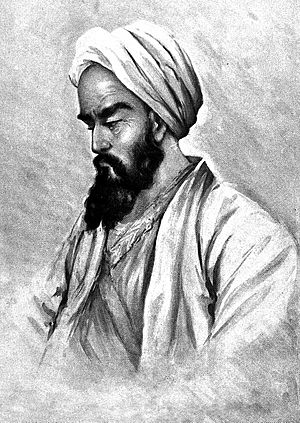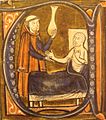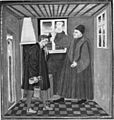Muhammad ibn Zakariya al-Razi facts for kids
Quick facts for kids
Razi
Abūbakr Mohammad-e Zakariyyā-ye Rāzī ابوبكر محمّد زکرياى رازى |
|
|---|---|
 |
|
| Born | 854 CE Ray, Abbasid Caliphate (Iran)
|
| Died | 932 (aged 77–78)
or 925 (aged 70–71) CERay, Samanid Empire (Iran)
|
| Era | Islamic Golden Age |
| Region | Islamic philosophy |
|
Main interests
|
Medicine, philosophy, alchemy, |
|
Notable ideas
|
The first to write up limited or extensive notes on diseases such as smallpox and chickenpox, a pioneer in ophthalmology, author of the first book on pediatrics, making leading contributions in inorganic and organic chemistry, also the author of several philosophical works. |
Abū Bakr Muhammad Zakariyyā Rāzī (Persian: ابوبكر محمّد زکرياى رازى Abūbakr Mohammad-e Zakariyā-ye Rāzī), also known as Rhazes or Rasis, was an amazing Persian scholar who lived from 854 to 925 CE. He was a true polymath, meaning he was an expert in many different fields. He was a skilled physician, an alchemist, a philosopher, and a very important person in the history of medicine. He also wrote about logic, astronomy, and grammar.
Razi was a deep thinker who made huge contributions to many areas of knowledge. He wrote over 200 books and papers! He is especially remembered for his many breakthroughs in medicine. He used careful observations and made important discoveries.
Contents
A Pioneer in Medicine
Razi was one of the first people to use experimental medicine. This means he tested his ideas to see if they worked, rather than just guessing. He became a very successful doctor. He even served as the chief physician in hospitals in Baghdad and Ray.
Teaching and Patient Care
As a teacher of medicine, Razi attracted students from all walks of life. People say he was very kind and dedicated to helping his patients. It didn't matter if they were rich or poor, he treated everyone with care.
Understanding Diseases
According to the Encyclopædia Britannica, Razi was among the first to use the idea of humoral theory to tell different contagious diseases apart. He wrote a groundbreaking book about smallpox and measles. In this book, he clearly described the symptoms of these diseases.
Impact on Medical Knowledge
Razi's medical writings and ideas became very well known. They were translated and spread throughout Europe during the Middle Ages. His work greatly influenced how medicine was taught in Western universities.
Key Contributions
Some parts of his book Al-Mansuri, especially sections on "Surgery" and "A General Book on Therapy," became required reading for medical students in the West. Edward Granville Browne, a famous scholar, called him "probably the greatest and most original of all the Muslim physicians." He also said Razi was one of the most productive writers.
Razi is often called the father of pediatrics, which is the study of children's health. He was also a pioneer in obstetrics (care during childbirth) and ophthalmology (the study of eyes). For example, he was the first to notice how the pupil of the eye reacts to light.
See also
 In Spanish: Al-Razi para niños
In Spanish: Al-Razi para niños
Images for kids
-
Depiction of al-Razi in a 13th-century manuscript of a work by Gerard of Cremona
-
al-Razi examining a patient (miniature painting by Hossein Behzad, 1894–1968)
-
al-Razi in his laboratory (orientalist painting by Ernest Board, c. 1912)
 | Laphonza Butler |
 | Daisy Bates |
 | Elizabeth Piper Ensley |








